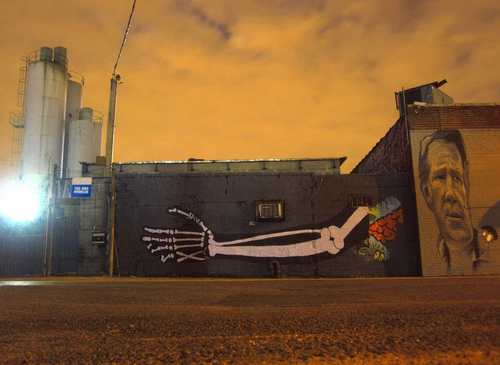I'd seen some of NTG's work around Seattle and liked it without knowing the origins (NTG doesn't sign his pieces), then via some serendipitous facebook posts and some more web sleuthing, discovered that the same guy who was putting owls on highway overpasses and wolves on utility boxes was responsible for the large hand-colored John T. Williams mural on Capitol Hill. Recently, I had the opportunity to talk to NTG about his upcoming show at 4Culture. On a quintessentially Seattle rainy evening, we sat in a typically hipster Capitol Hill cafe and talked about Seattle activism, street art and fishing.
NTG has spent much of his life on two famous sounds, Prince William and Puget. When he first came to Seattle to live, he made his home in artist lofts in one of the grittier parts of the city. A recent BFA graduate, he concentrated mostly on oil painting, but was increasingly affected by his new urban environment and at the same time wanted to release his art from the confines of gallery walls. Those impulses gave rise to his first street art. The sense of alienation he felt is echoed in his wheatpastes, creatures of the wilderness surprised to be surrounded by so much concrete.
To keep himself from getting too tethered to the city or secluded in the rarefied bubble of an artist's life, NTG spends his summers working as a professional commercial fisherman during the Alaska salmon run. In a flannel pattern jacket and dark gray Fidel cap, he blends seamlessly into the PNW coffeehouse crowd, his secret street artist identity hinted at only by some wheatpaste and paint stains on the frayed edges of his long sleeve shirt cuffs.
| NTG's Wheatpaste |
 |
| Overunder's mural, underneath the wheatpaste |
NTG with NKO and photographer Dan Hawkins, are part of the The New Mystics. Their 4Culture show opening April 7th is part representation/part reproduction of a large scale installation piece the three artists created in an abandoned peanut butter factory in the industrial SODO area of Seattle.
At the time NTG was working on the installation, he was going through a transition himself, having just been laid off as an art teacher. The title of the show, 'tomb' and the subject of his work reflect the idea of transformation and loss, grieving the old, but also making space for what's to come. The crosses are from photographs taken from an old Native cemetery in Alaska, then wheatpasted to palettes and scattered around the abandoned building that was destined to be destroyed in a dramatic fire just a few months later. Now the site is being championed by the Mayor as a permanent city-sanctioned homeless encampment. After the 4Culture exhibit, the artists plan to take the reproductions of the old factory walls back to the site and photograph the reproduction of the installation in its place of origin, completing the circle.
 |
| photo by Dan Hawkins |
